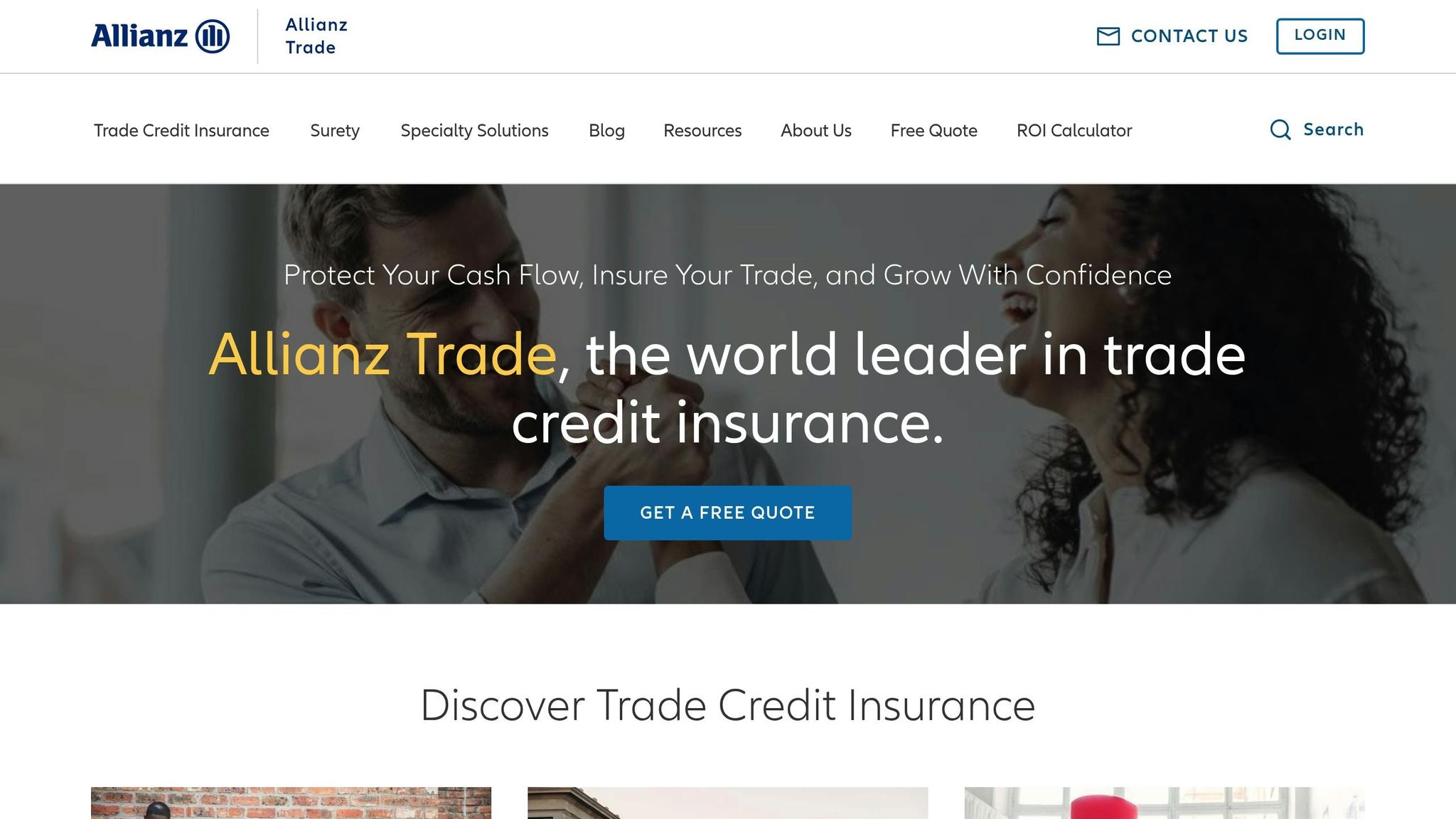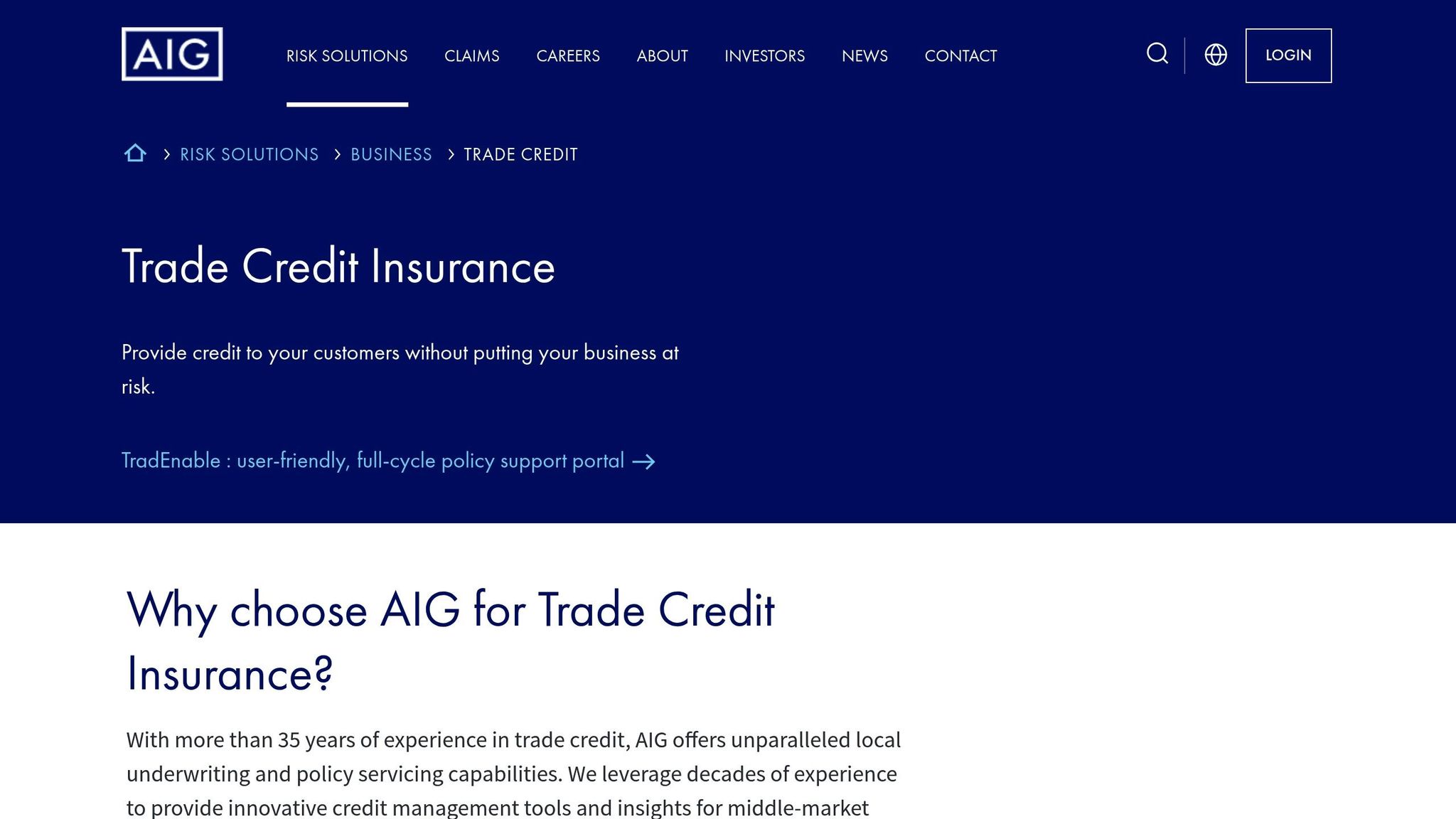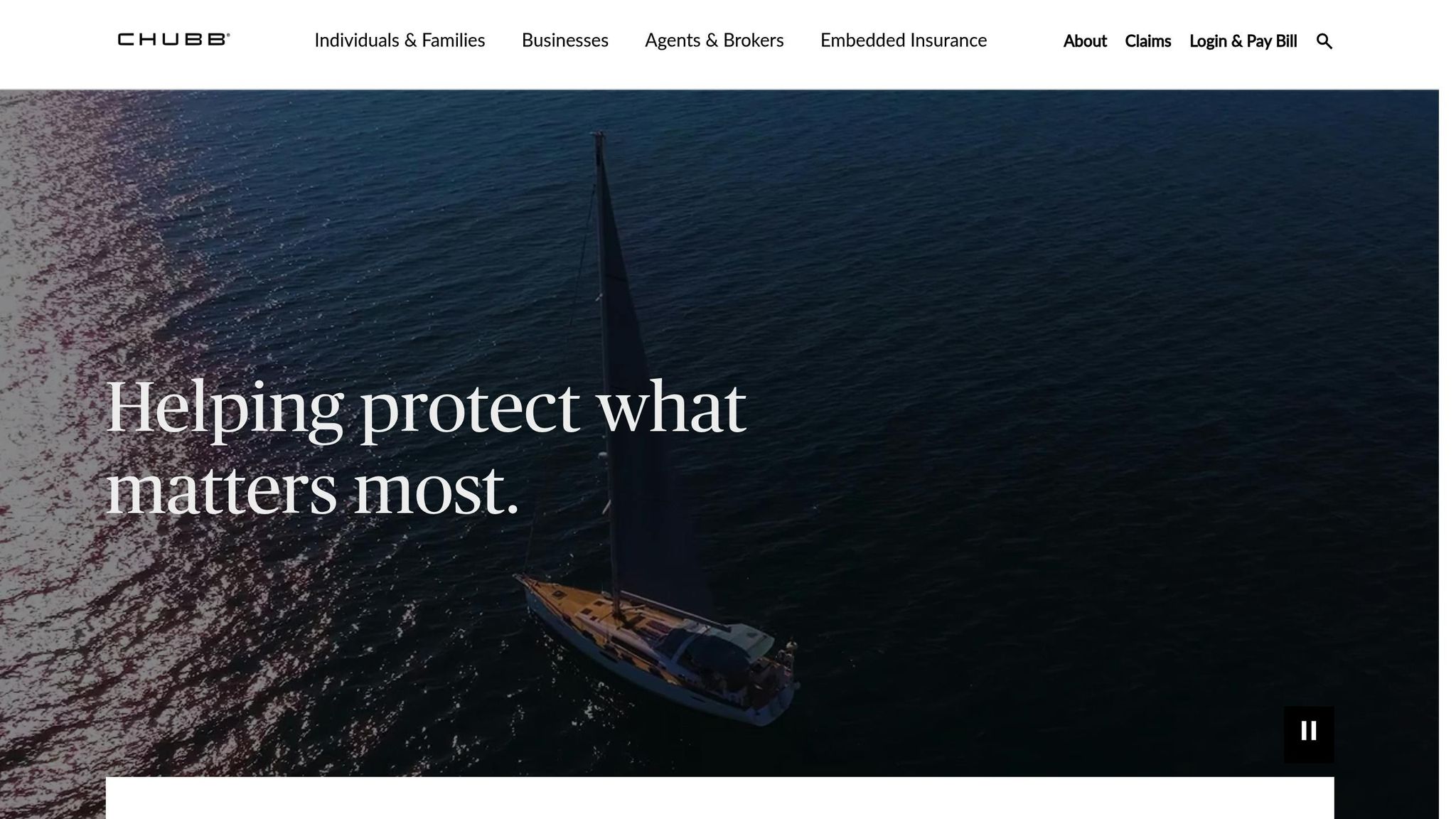Looking for the best trade credit insurance provider? Here’s what you need to know upfront:
Trade credit insurance protects your business when customers fail to pay invoices due to insolvency, bankruptcy, or political risks. It typically covers up to 90% of losses, helping businesses maintain cash flow and grow with confidence. This article compares the top 5 carriers – Allianz Trade, Atradius, Coface, AIG Trade Credit, and Chubb – based on coverage, pricing, and global reach.
Key Takeaways:
- Allianz Trade: Extensive risk assessment and global coverage; tailored solutions like CAP and CAP+.
- Atradius: Modular policies for customizable coverage; strong digital tools.
- Coface: Expertise in political risk and emerging markets; flexible global solutions.
- AIG Trade Credit: Non-cancelable credit limits; focus on stability for mid-sized businesses.
- Chubb: Wide global presence; versatile solutions for different industries.
Quick Comparison:
| Feature | Allianz Trade | Atradius | Coface | AIG Trade Credit | Chubb |
|---|---|---|---|---|---|
| Global Coverage | 160+ countries | 50+ countries | 200 markets | 70+ countries | 54 countries |
| Key Strength | Risk assessments | Customization | Political risks | Non-cancelable limits | Versatility |
| Pricing | ~0.25% of sales | 0.1%-0.5% turnover | Competitive | Predictable premiums | Industry standard |
| Tech Platform | Online management | Modular platform | Local expertise | TradEnable portal | Standard tools |
Choose the carrier that best fits your business needs – whether you value global reach, customization, or financial stability. Now, let’s dive deeper into how these providers compare.
Credit Insurance as a Risk Mitigation Tool for International Trade
What Is Trade Credit Insurance
Understanding the basics of trade credit insurance is crucial before diving into the specifics of different providers. At its core, trade credit insurance protects businesses from financial losses when customers fail to pay their invoices. As Coface explains:
Trade Credit Insurance is a credit risk management solution that safeguards the development of your business, in particular by protecting you against losses due to non-payment of invoices.
This type of insurance secures your accounts receivable by covering up to 90% of losses from unpaid invoices.
How Trade Credit Insurance Works
The process starts with you providing your insurer with detailed information about your company and your clients. Using this data, the insurer evaluates the financial stability of your customers to determine credit limits and establish commercial terms. They also monitor your clients over time, adjusting coverage as necessary to reflect changing circumstances.
Trade credit insurance covers a range of risks that could disrupt your cash flow. These include extended payment delays, customer insolvency, and even political events that prevent international clients from paying. This level of protection ensures smoother operations and supports business growth.
Real-World Impact
In practice, trade credit insurance has proven invaluable for many businesses. For example, manufacturers operating in volatile markets have used it to secure their receivables. This has allowed them to offer competitive payment terms, maintain steady cash flow, and expand into international markets. These examples highlight the added financial advantages of having this safety net.
Financial Benefits Beyond Protection
Trade credit insurance doesn’t just protect your business – it also provides financial stability. By ensuring consistent cash flow even when customers face financial challenges, it can help you negotiate better financing terms. Banks often view insured receivables as safer assets, which can unlock more favorable loan conditions.
Surprisingly, the cost of this coverage is relatively low. Premiums typically amount to less than 0.5% of your total turnover, with rates ranging between 0.05% and 0.6%. In fact, 14.52% of global trade in 2020 was safeguarded by credit insurance, underscoring its widespread adoption.
Allianz Trade highlights this advantage:
Trade credit insurance protects your account receivables, enabling you to trade, expand domestically and abroad without the risk of bad debt.
With this protection, businesses can confidently explore new markets or industries, knowing their receivables from unfamiliar or international buyers are covered. Many policies also include added perks like risk assessments and debt collection services.
How We Selected the Top 5 Carriers
We analyzed trade credit insurance providers using five key factors that directly influence protection and business growth.
Financial Strength was our primary focus. A carrier’s financial health is crucial for ensuring claims are paid when customers default. To evaluate this, we looked at credit ratings, capital reserves, and market presence. This is critical because trade debts can account for 40% or more of a business’s assets, making the insurer’s reliability a cornerstone of financial security.
Policy Flexibility came next. Businesses have unique needs, and coverage should reflect that. We reviewed how well each carrier could tailor policies – whether for domestic buyers, key accounts, or export customers. The top providers offer customizable options to align with your specific risk profile and operational model.
Claims Process Efficiency proved essential for maintaining cash flow during disruptions. We examined how quickly claims are processed, the documentation required, and settlement histories. With customer defaults or insolvencies responsible for 25% of corporate bankruptcies, a smooth claims process can mean the difference between resilience and financial distress.
Global Market Presence was another crucial factor. Carriers with extensive global networks bring local expertise and market insights. For instance, Allianz Trade oversees 83 million businesses across 160 countries, and Coface operates in 46 countries while offering coverage in roughly 200 markets. This broad reach supports better risk evaluation and quicker decision-making in diverse regions.
Pricing Structure rounded out our criteria. We didn’t just look at premium costs – typically $1.00 to $1.50 per $1,000 of sales – but also assessed the transparency of pricing models and the value-added services included. The best carriers provide clear, predictable pricing, making it easier to calculate returns on investment.
Beyond these factors, we also considered how carriers approach long-term partnerships. Experts stress that insurers should act as ongoing collaborators, offering advice and support for businesses expanding into new markets or navigating complex international transactions. This kind of guidance can be invaluable when managing global operations.
We prioritized these criteria based on their impact on business stability and growth. Financial strength and claims efficiency were weighted most heavily, given their direct role in mitigating risks from customer defaults. Policy flexibility and global presence followed, especially for companies with diverse or international customer bases.
Our analysis highlighted meaningful differences among providers. Some excel in specific regions, while others stand out for their advanced technology or quicker underwriting processes. This variety allows businesses to find the best match for their unique needs. Let’s now explore how these criteria shaped our top five picks.
Top 5 Trade Credit Insurance Carriers Compared
When it comes to trade credit insurance, these five carriers rank among the top in the industry. Each brings unique strengths in coverage options, pricing structures, and global accessibility, making them valuable for businesses looking to protect their financial interests. Here’s a closer look at what they offer.
Allianz Trade (Formerly Euler Hermes)
Allianz Trade distinguishes itself with its Corporate Advantage solution, which tailors coverage to suit your business needs. Whether you’re managing domestic transactions or international trade, this platform provides comprehensive protection for trade credit receivables across both markets.
One of Allianz Trade’s standout features is its extensive risk assessment system, which evaluates 289 million businesses using a robust grading database. This enables faster and more informed underwriting decisions, giving you a clearer picture of potential risks.
On the pricing front, Allianz Trade typically charges about 0.25% of annual sales. For instance, a company with $20 million in annual revenue might expect to pay around $50,000 annually in premiums. Costs are influenced by factors such as B2B turnover, operating regions, customer profiles, payment terms, and the desired level of coverage.
Allianz Trade also offers specialized products like CAP and CAP+, designed to address partially approved or declined credit limits. CAP costs 2% per year (or 0.167% monthly) of the limit value, while CAP+ is priced at 6% annually (or 0.5% monthly).
Atradius N.V.
Atradius takes a flexible approach with its Modula policy, allowing businesses to build protection from modular coverage blocks. This customization ensures you only pay for the coverage you actually need, aligning insurance with your specific risk profile.
Their Atrium platform simplifies policy management, enabling users to set credit lines, file claims, track updates, and make adjustments in real time.
Pricing aligns with industry norms, ranging from 0.1% to 0.5% of turnover. For every 100 euros insured, businesses typically pay between 10 and 50 euro cents. Factors like trading history, sector, credit terms, customer ratings, and geographic exposure determine the exact rate. Atradius also boasts a strong customer retention rate of 95%. As one client, Vishnu Gopie of LG Electronics, shared:
"The relationship and service levels provided by Atradius are second to none. Atradius fully understands our business needs and requirements."
Coface SA
Coface operates in 46 countries and provides coverage across 200 markets, making it a strong option for businesses with global or emerging market exposure. Their network combines localized expertise with global resources, which helps businesses navigate complex international risks.
Coface offers two distinct policy options: GlobaLiner, which provides broad global protection, and TopLiner, designed for key accounts and high-priority relationships. This flexibility allows businesses to choose the level of coverage that best aligns with their strategic goals.
AIG Trade Credit
AIG Trade Credit stands out with its non-cancelable limits coverage, which ensures that approved credit limits remain intact, even if market conditions shift. This stability can be a game-changer for businesses looking to maintain consistent sales planning.
Operating in about 70 countries with extended reach to 190 nations through partners, AIG offers a truly global footprint. Their TradEnable℠ platform streamlines policy management, allowing businesses to oversee policies and portfolios online.
AIG’s A/R Secure product is tailored for businesses with annual sales between $10 million and $100 million. It provides predictable premiums and an efficient claims process. For example, a U.S. pharmaceutical company used this coverage to secure credit protection and deliver test kits on time for a government contract.
Chubb Limited
Chubb Limited provides trade credit insurance in 54 countries, offering extensive global coverage. Their solutions cater to businesses of various sizes and industries, making them a versatile choice for companies with diverse operational needs.
Each of these carriers brings unique advantages, whether you’re focused on global expansion, customized coverage, or stability in uncertain markets. By aligning their strengths with your business goals, you can choose the option that best supports your operational and financial strategy.
sbb-itb-2d170b0
Side-by-Side Comparison
When you compare these five carriers, it’s clear they each bring unique strengths to trade credit insurance. While all provide solid protection, their specific areas of focus make them better suited for different business needs.
Global reach highlights how each carrier supports businesses expanding internationally. Allianz Trade excels with its extensive transaction monitoring across multiple regions, while Coface’s presence in 199 countries makes it a strong choice for companies entering emerging markets.
Coverage specialization sets them apart as well. Allianz Trade offers a wide range of options, including bad debt protection, cash flow management, accounts receivable coverage, surety bonds, fraud insurance, debt collection services, and e-commerce credit insurance. AIG Trade Credit focuses on non-cancelable limits for entire accounts receivable portfolios or specific buyers. Coface, on the other hand, stands out with customizable plans and a strong emphasis on political risk coverage.
Technology platforms also reflect their operational priorities. AIG’s TradEnable portal provides full-cycle policy management, while Allianz Trade simplifies things with an online contract management tool offering flexibility and customization. Atradius uses a modular online platform, allowing businesses to build tailored coverage from specific policy blocks.
Here’s a quick breakdown of the key differences:
Comparison Table
| Feature | Allianz Trade | Atradius | Coface | AIG Trade Credit | Chubb Limited |
|---|---|---|---|---|---|
| Global Coverage | Americas, Europe, Asia Pacific, Middle East & Africa | 50+ countries | 199 countries | 70+ countries | Global presence |
| Key Strength | Comprehensive risk assessment | Modular customization | Political risk expertise | Non-cancelable limits | Versatile solutions |
| Key Offerings | Corporate Advantage | Modula policy blocks | Customizable solutions | TradEnable portal | Industry-specific coverage |
| Technology Platform | Online contract management | Online platform | Local expertise network | TradEnable portal | Standard management tools |
| Pricing Structure | ~0.25% of annual sales | 0.1%-0.5% of turnover | Market competitive | Predictable premiums | Industry standard |
| Political Risk Coverage | Available | Available | Specialized focus | Available | Available |
| SME Focus | Corporate Advantage | GO Policy for SMEs | Flexible approach | – | Multi-size approach |
Claims and service quality also play a major role in differentiating these carriers. For example, AIG Trade Credit proved its value when a mid-sized electronics company faced reduced limits and cancellations from its previous provider. AIG stepped in with a tailored program offering strong non-cancelable protection.
Ultimately, your choice should match your business’s unique risks and priorities. If guaranteed credit stability is critical, AIG’s non-cancelable limits are a strong fit. Companies looking for maximum customization may prefer Atradius’s modular solutions. For businesses facing political risk, Coface’s expertise shines. And for those needing extensive global coverage, Allianz Trade’s robust network is a standout option.
Accounts Receivable Insurance Solutions
When it comes to protecting your business’s revenue, Accounts Receivable Insurance (ARI) offers a tailored solution that goes beyond generic policies. ARI focuses on creating customized insurance programs designed to fit your specific needs and risk profile, ensuring you get the right level of protection where it matters most.
One standout feature of ARI is its single-buyer policies, which are ideal for businesses heavily reliant on a single customer. These policies provide coverage for short- or medium-term repayment terms, helping safeguard against potential losses from a key account. For companies working with tight budgets, ARI can also structure policies with coverage above a deductible, offering a more budget-friendly option.
ARI also provides named buyer policies and single risk policies for more targeted protection. Named buyer policies cover only the accounts you specifically identify as critical, while single risk policies focus on individual transactions or contracts. This approach ensures you’re only paying for coverage that directly addresses your most pressing exposures.
What sets ARI apart is its reliance on integrated risk assessments. Using advanced data analysis, ARI determines precise coverage amounts and credit limits. These assessments give businesses a clear view of their credit exposure, helping them make informed credit management decisions.
For companies operating in unstable industries or venturing into new markets, ARI’s flexibility is a major advantage. Policies can be tailored to reflect the unique risks of your industry, ensuring coverage aligns with your specific operational challenges.
Another key benefit is ARI’s focus on transparent and cost-effective pricing. By designing policies that fit your budget and leveraging a broker-based model, ARI provides dedicated support to help you find the most affordable and effective coverage for your needs.
ARI also goes beyond traditional insurance with its claims management and pre-claim intervention services. Instead of waiting for defaults to occur, ARI takes proactive steps to recover payments early, reducing the severity of losses and improving outcomes for both your business and the insurer.
For businesses with international operations, ARI offers even more value through its global network of credit insurance carriers. This network allows ARI to match your specific risks – whether related to political instability, industry nuances, or geographic factors – with the right carrier. This flexibility is especially beneficial for companies with complex international exposures or unique risk profiles.
If your business generates over $10 million in annual sales, ARI’s customized approach often delivers better results than standard market options. With its combination of tailored coverage, integrated risk management, and dedicated broker support, ARI provides a comprehensive solution that aligns with your business’s strategic goals and trade credit insurance needs.
Conclusion
Selecting the right trade credit insurance provider involves aligning your specific risk profile with carriers that offer not only global reach but also expertise tailored to your industry.
The trade credit insurance market is on a steady rise. By 2024, insured exposure is projected to hit $3.2 trillion, with premiums reaching $8.2 billion. Claims paid are expected to grow by 11.4%, while penetration rates increase from 13.16% to 15.07%. This growth highlights how businesses are becoming more aware of credit risks, with many realizing that trade credit insurance often costs less than 0.5% of their turnover – a small price compared to the potential losses it helps prevent.
"SMEs are the backbone of the US economy, yet they are frequently left behind when it comes to specialised insurance solutions." – David Waldorf, President & Chief Commercial Officer, FinSurance Group Services
When assessing carriers, it’s crucial to look beyond just the price tag. Consider their financial stability, ability to maintain credit limits during economic downturns, and expertise in your industry and target markets. A strong global database for buyer evaluations and efficient claims handling can significantly enhance your experience. Taking a comprehensive approach to evaluation ensures you choose a carrier that aligns with both your immediate needs and long-term goals.
In times of economic uncertainty, the importance of a carrier’s resilience and consistent credit support becomes even more apparent. Competitive pricing is important, but so is their ability to stand by you when challenges arise.
For businesses with annual sales exceeding $10 million, specialized policies and integrated risk assessments offer solutions tailored to complex scenarios. Whether you need single-buyer coverage, named buyer policies, or comprehensive portfolio protection, the key lies in finding a provider that understands your unique business model. A responsive carrier that evolves with your needs can help your business navigate uncertainties and grow with confidence, even in a volatile economic landscape.
FAQs
What should I look for when choosing a trade credit insurance provider?
When choosing a trade credit insurance provider, there are a few critical factors to keep in mind to find the right match for your business. Start by evaluating the coverage options. The policy should safeguard you against risks such as non-payment, customer bankruptcy, and political disruptions. Make sure it aligns with the specific needs of your industry to avoid any gaps in protection.
Next, take a close look at the provider’s claims process. A smooth and efficient claims system, paired with reliable customer service, can make all the difference when you’re navigating challenging situations.
You’ll also want to assess the provider’s financial stability and global reach, particularly if your business operates in international markets. A financially secure provider with a strong worldwide presence is better equipped to handle claims and support your operations across different regions. Finally, prioritize a provider with experience in your industry. This ensures they understand the unique challenges and risks your business might encounter.
How can trade credit insurance help businesses reduce risks in international markets?
Trade credit insurance is a valuable tool for businesses navigating international markets, offering protection against the risk of non-payment by foreign buyers. It safeguards companies from financial losses caused by buyer insolvency, delayed payments, or even political events that might disrupt trade. This ensures businesses maintain a steady cash flow and minimizes financial uncertainty.
Beyond protection, trade credit insurance empowers businesses to extend credit to international customers with confidence, giving them a competitive edge in global markets. It also provides access to insights about the creditworthiness of potential clients, helping businesses make informed decisions and build a foundation for long-term financial stability.
How much does trade credit insurance typically cost for businesses with over $10 million in annual sales?
For companies generating over $10 million in annual sales, trade credit insurance typically costs between 0.1% and 0.4% of total sales. That means you’re looking at an annual premium ranging from $10,000 to $40,000.
The actual cost varies based on several factors, including your industry, the creditworthiness of your customers, and the coverage level you select. Larger businesses often secure better rates due to their higher sales volumes. This insurance serves as a safety net, shielding your business from risks like customer non-payment, bankruptcies, or even political turmoil. It’s a practical way to protect your accounts receivable and maintain financial stability.








